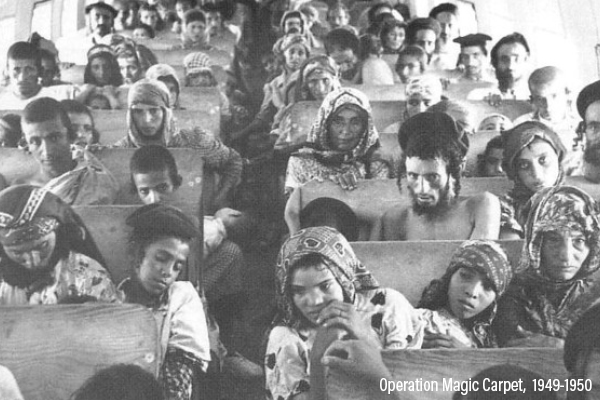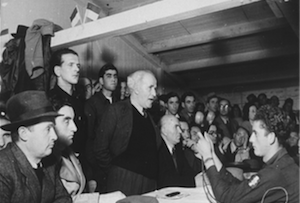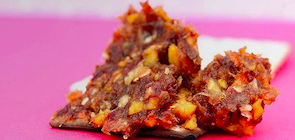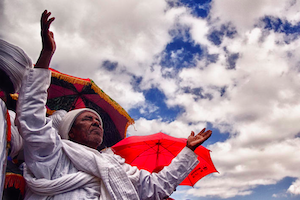And I will Betrothe You With The Mimouna
By Ran Huri
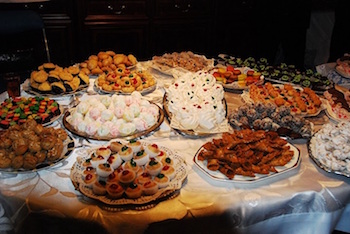
On the day following Passover, Israel celebrates. Crowds from all ethnic backgrounds joyfully celebrate the Mimouna in cities and in homes with song, food and feasts. Large posters in city streets announce Mimouna celebrations in parks, artists perform and politicians drop in, it is a time of great joy.
What is behind the Mimouna? What values are expressed by the festival? There are some Moroccan elders who can tell us about the festival as it took place in Morocco, about opening homes and hearts, about a holiday of friendship, about the renewed encounter between Jews and Arabs at the Pesach holiday's end. During the conversation we held with Rabbi Raphael Marciano, who researched the Mimouna, we heard about the festival and its history; many would be as happy as he to tell the story.
In order to provide a contemporary basis for this festival and to deepen public familiarity with it and with the experience it offers, we produced a new study booket in honor of the Mimouna with the Tikun Movement, part of the Daily Sage series. The booklet, entitled: And I Will Betrothe You to Me With the Mimouna, was written and edited by Eli Bareket, Kol Israel VP and Director of the Division for Education and is intended to make the content of the Mimouna accessible to the general public in Israel, share the message of shared existence for all, and add content to the moufletta pancake and joyful celebrations.
"There are several central foundations to the Mimouna that should be illuminated and provided with a more meaningful presence in the ways we celebrate," says Dr. Yehuda Maimaran, Kol Israel Haverim's CEO. "The first is love between Jews. The meaning of this is a united nation, without categories or classifications: The Jewish people celebrates as a united family."
"The second foundation is the love of humankind as such. During this festival there is an understanding of the interdependence and partnership between all people in the world. These two foundations express generosity between individuals and an openness toward living together. Opening the door and hospitality testify to the recognition of the value of mankind, equality and shared responsibility between people.
The deep ideas that form the basis of the Mimouna celebration create a festival that is neither ethnic nor sectorial but is part of the shared heritage of all of Israel."
The booklet has four chapters that express the Mimouna values: a chapter on faith, a chapter on blessing, a chapter on friendship and a chapter on hospitality. "The composition of these principles into a unified principle contains what each and all the components convey," says Dr. Meir Buzaglo, Chairman of the Tikun Movement. "Faith and spirituality are not contrary to blessings of plenty, represented by butter, honey and, of course, the moufletta. Faith reveals its facet of generosity and yields to friendship."
Each chapter opens with a poem by Rabbi David Buzaglo and ends with a poem by Erez Biton; each includes men and women sages in an internal dialog with each other. The figure of our father Abraham, present in each of the booklet's chapters and their values, accompanies us throughout. As Eli Bareket says in the booklet's introduction: "We find his image watching us from the windows of each chapter, Abraham in faith, Abraham in blessing, Abraham in friendship, Abraham in hospitality, and Abraham, in the last poem, 'shining like a star from Ur Kasdim to illuminate the darkness'."
Some may ask, what relevance has a study booklet – which would seem to require a quiet circle, attention and concentration – to a celebration of family, plenty, food, and joyous voices? The training days that we held in our offices at Mikve Israel and in Jerusalem, a taste of which you can see in the photographs in this article, prove that the booklet contributes to the festivities. That the booklet is connected to the festive Mimouna experience, and reaches the table along with the physical moufletta as some sort of "spiritual moufletta". That the presence of men and women sages, Mimouna values, and the celebration of friendship and love in the festival are a blessing. During the training days, scores of people from diverse circles and backgrounds shared in celebrating the Mimouna, in song, food and dance, studied and laughed, and took the booklet with them on their journey to share, study, teach, and illuminate the Mimouna.
You’re invited to follow the Israeli Mimouna Facebook page for more surprises.

